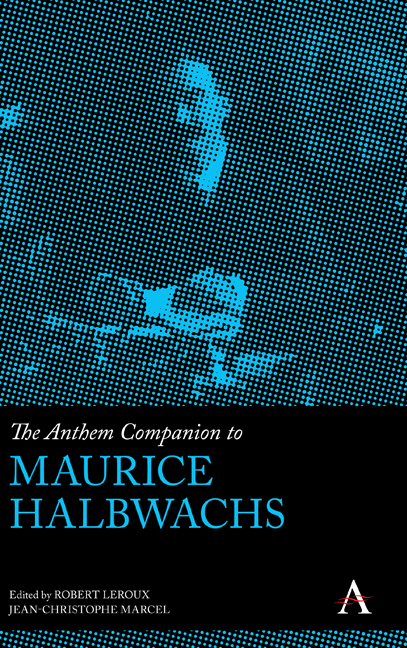Book contents
- Frontmatter
- Contents
- Introduction
- Chapter 1 A Theorist of Collective Memory
- Chapter 2 Halbwachs and the Durkheimian Perspective on History
- Chapter 3 Maurice Halbwachs, Sociologist of Memory: His Reception in Italy and the Development of the Sociology of Memory
- Chapter 4 Population as the Body of Society
- Chapter 5 Urban Morphology and Social Morphology: Marcel Roncayolo and the Work of Maurice Halbwachs
- Chapter 6 Halbwachs’s Leibniz and Halbwachs’s Sociology
- Chapter 7 Halbwachs on Quetelet and the Use of Statistics in Sociology
- Chapter 8 Maurice Halbwachs and the Sociology of Consumption and Social Classes
- Chapter 9 From Criticism of Moral to the Probalistic Test
- Chapter 10 The Age Criterion: Between Sociology and Biology
- Chapter 11 Speculation: Order or Disorder?
- List of Contributors
- Index
Chapter 8 - Maurice Halbwachs and the Sociology of Consumption and Social Classes
Published online by Cambridge University Press: 23 February 2022
- Frontmatter
- Contents
- Introduction
- Chapter 1 A Theorist of Collective Memory
- Chapter 2 Halbwachs and the Durkheimian Perspective on History
- Chapter 3 Maurice Halbwachs, Sociologist of Memory: His Reception in Italy and the Development of the Sociology of Memory
- Chapter 4 Population as the Body of Society
- Chapter 5 Urban Morphology and Social Morphology: Marcel Roncayolo and the Work of Maurice Halbwachs
- Chapter 6 Halbwachs’s Leibniz and Halbwachs’s Sociology
- Chapter 7 Halbwachs on Quetelet and the Use of Statistics in Sociology
- Chapter 8 Maurice Halbwachs and the Sociology of Consumption and Social Classes
- Chapter 9 From Criticism of Moral to the Probalistic Test
- Chapter 10 The Age Criterion: Between Sociology and Biology
- Chapter 11 Speculation: Order or Disorder?
- List of Contributors
- Index
Summary
On the one hand, there is the ‘classic’ Maurice Halbwachs, the author of ‘On Collective Memory’ who linked collective psychology to past representations. And then there's the Halbwachs who merely touched the surface of some themes, opening them up, breezing over them and then moving on, or at least apparently. However, it seems to me that I can say, with sufficient certainty, that this is an altogether hasty interpretation and that it does not give full credit to the skills of this author and to the depth of his thought, having dug deep into some of the most innovative themes of early twentieth-century sociology, reaching hidden depths to subsequently re-emerge. This is the case, for example, for studies on consumer behaviour and social classes, a theme which goes hand in hand with this author's roots, cropping up several times throughout the course of his intellectual life and speaking, more so than others, of the peculiar awareness of the man combined with the finesse of the social analyst.
Maurice Halbwachs's interest in the issues of inequality, injustice, social exclusion and class stratification in industrial modernity was rooted in the socialist milieux of his civil and intellectual education (Marcel 2002) and traversed much of his intellectual pathway. The years (1898– 1901) he spent at the Ecole Normale Supérieure, where he achieved an agrégation in philosophy, were crucial in forming Halbwachs's social awareness and defining his subsequent research interests. The Dreyfus affair was raging across France: Émile Zola sent his j’accuse…! (J’accuse) letter; the retrial for the captain of the French1 army was celebrated in Rennes; at the École Normale, politics burst onto the scene and young students had to choose a side. Maurice Halbwachs, from Alsace, just like Dreyfus (whose story also played a part in the long history of German annexation of that region), admirer of Jean Jaurès (whose famous Preuves appeared in that very year of 1898), a methodical and scrupulous reader, became a socialist. Halbwachs never became a politician, but neither did he ever cease his political activity.
- Type
- Chapter
- Information
- The Anthem Companion to Maurice Halbwachs , pp. 129 - 138Publisher: Anthem PressPrint publication year: 2021



